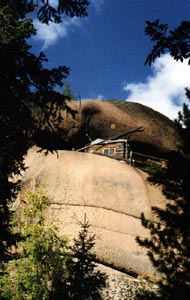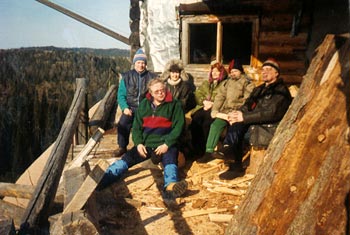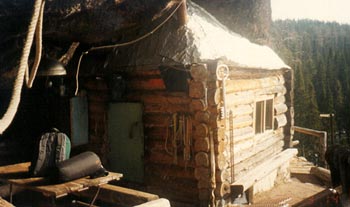The songs of the Griffun
Francis Greene
I have been asked to write a few serious words for a
serious publication about my visit to the Griffin in 1992, but I find the
task difficult. How can one write dispassionately of an event which evoked
strong and various passions, and of which the memory has so little
relation to everyday reality, is so improbable and dreamlike?
 The
Griffin is a natural rock fissure which has been transformed into
something between a cave and an izba. It is at the summit of one of the
curious rock pinnacles, the "Stolby", which can be ascended only
by skilled specialist climbers. I am not such a one and I was taken up
there as a piece of luggage. I was in good hands, but for me, with no
sense of balance and no head for heights, the prospect of such a journey (for
snow still clung to the glassy rock) was indeed alarming. Perhaps the last
few feet of the ascent were the worst. The drawbridge or "doorlock"
to this eyrie is a thin wooden spar spanning an abyss: when removed the
route is barred to any but a very exceptional "stolbist". I
remember well the elation I experienced on arriving at my destination
after successfully crossing its drawbridge, damped only by the realisation
that to fulfill any call of nature I would have to find my way all the way
back down to the bottom! The
Griffin is a natural rock fissure which has been transformed into
something between a cave and an izba. It is at the summit of one of the
curious rock pinnacles, the "Stolby", which can be ascended only
by skilled specialist climbers. I am not such a one and I was taken up
there as a piece of luggage. I was in good hands, but for me, with no
sense of balance and no head for heights, the prospect of such a journey (for
snow still clung to the glassy rock) was indeed alarming. Perhaps the last
few feet of the ascent were the worst. The drawbridge or "doorlock"
to this eyrie is a thin wooden spar spanning an abyss: when removed the
route is barred to any but a very exceptional "stolbist". I
remember well the elation I experienced on arriving at my destination
after successfully crossing its drawbridge, damped only by the realisation
that to fulfill any call of nature I would have to find my way all the way
back down to the bottom!
But, as I was soon to learn, the Griffin stands for
much more than a physical challenge - a physical challenge which is,
almost like ballet, also a form of art. I am one of the least
distinguished (as well as one of the most timorous) of the guests to have
been taken there. The Griffin, it transpires, is an international cultural
meeting centre (and I hope the small Union Jack which I had brought with
me is still hanging among many other flags on its wall). Most eminent of
its guests have been the "bards" - those poet composers who kept
the soul of Russia alive through dismal repressive times of forced
conformity. The great Yuli Kim has been here and has sung here, so has the
fine (albeit lesser) poet-singer Shcherbakov and another singer of world
renown, Elena Kambourova.
 I
was soon to discover that this lofty (in all senses) tradition is
maintained. I was treated to what can truly be described as the most
exclusive concert performance in the most inaccessible concert hall in all
the world. Here I heard not only the classic 20th century guitar
masterpieces - of Okudzhava, Kim and others - but many `author's songs',
fine in themselves and performed by their composers with exceptional
virtuosity. One male voice had a purity and power which forced the very
rock to resonate in sympathy. I
was soon to discover that this lofty (in all senses) tradition is
maintained. I was treated to what can truly be described as the most
exclusive concert performance in the most inaccessible concert hall in all
the world. Here I heard not only the classic 20th century guitar
masterpieces - of Okudzhava, Kim and others - but many `author's songs',
fine in themselves and performed by their composers with exceptional
virtuosity. One male voice had a purity and power which forced the very
rock to resonate in sympathy.
To return to earth - how can the Griffin be designated? As a
rockclimber's idyll? No doubt it is so, but for me that is far from the
greatest of its charms. As a historic monument to the resistance of
individualism to state power? There are remarkable accounts, yet to be
fully chronicled, of Soviet military helicopter attacks on the high nests
of the Stolbisty. No. The Griffin symbolises another sort of originality,
the one that is exemplified by any and every tight-knit group of
exceptionally talented people - a distinctiveness of the sort that has
given rise to scores of descriptive terms ending in "-ism", each
referring to the blazing of a trail in some new and spontaneous direction
for literature, poetry, art or music. Here on a snowy spire of rock above
the Krasnoyarsk taiga I was moved almost to tears by a blend of poetry and
music brilliantly performed by its poet-musicians - all of whom were also
skilled rock-climbers. I have met experiences of this sort elsewhere in
Russia but never with greater intensity. This then is what the Griffin has
come to mean for me, and it has been well named: the griffin of mythology,
offspring of a lion and an eagle and dedicated to the sun, was made the
guardian of hidden and sacred treasures.

|
|

